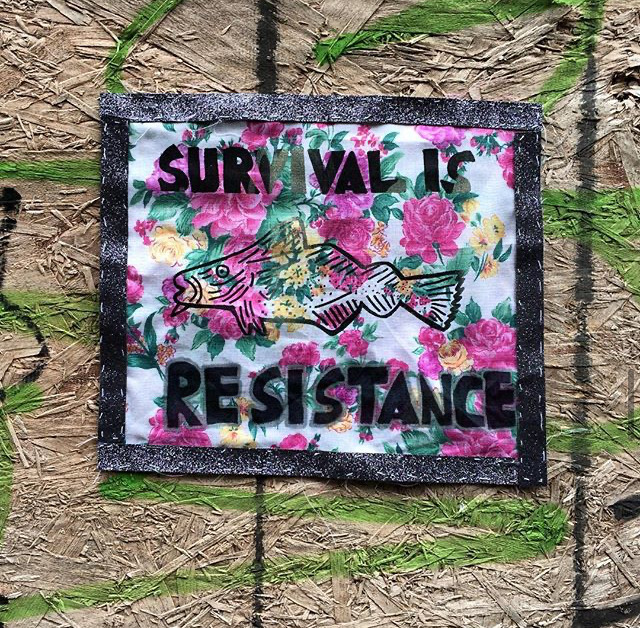Art + Feminism : Indigenous Voices
From the comfort of your home, Artexte invites you to explore the practices of artists, researchers, and cultural workers in the contemporary art milieu in Quebec and Canada through texts, publications and media dealing with a range of themes and perspectives developed by the Artexte staff and inspired by the interests of our community. Through our collection, events and blog articles, which include audio-visual capsules of lectures, audio interviews and writings, we invite you to explore Artexte’s various digital platforms and online resources.
In this first thematic strand in contemporary art and Indigenous perspectives, Artexte revisits its recent collaboration with the Musée d’art contemporain de Montréal which shed light on the work of artists and authors from groups that are underrepresented in Wikipedia, including women, people of colour, Indigenous people and people from LGBTQ2S+ communities, through a Wikipedia Art+Feminism edit-a-thon which took place on November 09, 2019.
During this event, Artexte and the MAC teams invited artists and a community coordinator to speak on the presence of their cultures on Wikipedia. For this panel, Artexte’s guests were Camille Larivée : first Wikipedian in residence at Artexte, as well as Thérèse Ottawa : coordinator of the Atikamekw language Wikipedia. Moreover, Artexte invited Maize Longboat, a participant in the first edit-a-thon of Indigenous Futures Cluster (IIF) whose interview was recorded following this edition of Art + Feminism.
For more information on the edit-a-thon Art + Feminism of November 09, 2019 :
Artexte and the MAC team up for : Art + Feminism Wikipedia edit-a-thon
Speakers biographies :
Camille Larivée is a street artist, independent curator, writer and cultural worker based in Tiohtià:ke / Mooniyaang, unceded Haudenosaunee and Anishinabe territories (Montreal, QC). She holds a bachelor’s degree in Art History and a Certificate in Women’s Studies from Université du Québec à Montréal (UQAM). She co-founded the collective Unceded Voices / Les Voix Insoumises in 2014, a convergence that works on the invisibility of Indigenous and women of color, 2Spirit and Queer women artists and muralists in Montreal’s urban space. Having recently completed the coordination of the Tiohtià:ke Project, an ambitious two-year cycle of exhibition and curatorial programming bringing together Indigenous artists and curators from Quebec and elsewhere for the Aboriginal Curatorial Collective / Collectif des Commissaires Autochtones (ACC–CCA), Camille continues to work for ACC-CCA where she is now the Director of Programming. In its most recent initiative Curating Care, the ACC-CCA invites Indigenous curators and creators to explain in a short video the role that care plays in their artistic practices and direct communities as well.
- For more details about the Curating Care initiative : https://acc-cca.com/programs/curating-care-support-right-now/
- To watch contributions by the participating artists and curators : https://vimeo.com/acccca
Thérèse Ottawa, Atikamekw artist from Manawan, practices photography. She has participated in several plays with Ondinnok theatre company* and she directed Red Path, a film made through Tremplin NIKANIK, a program co-sponsored by the NFB and the Aboriginal Peoples Television Network (APTN) with a view to supporting Indigenous francophone filmmakers in Quebec. The Atikamekw language, both written and spoken, has always been at the heart of her concerns, according to Ottawa, Wikipetcia is an important place to ensure its preservation and transmission. Moreover, since its beginnings in 2016, Ottawa has been coordinator of Wikipetcia Atikamekw. She has participated in presentations at Wikimania 2017 in Montreal and at the WikiConvention francophone de 2019 in Belgium.
Maize Longboat is Kanien’kehá:ka from Six Nations of the Grand River and was raised on the traditional, ancestral, and unceded territory of the Squamish Nation near Vancouver, BC. He is the Skins Workshops Associate Director with Aboriginal Territories in Cyberspace (AbTeC) and the Initiative for Indigenous Futures (IIF). He holds an MA in Media Studies from Concordia University in Tiohtiá:ke/Montreal and a BA in First Nations Studies and History (double major) from the University of British Columbia. His MA research-creation thesis project examined Indigenous videogames and culturally-connected development practices through the production of his own game, Terra Nova, a two-player, cooperative platformer with an interactive narrative.
- For free download Terra Nova : https://maizelongboat.itch.io/terra-nova
- To chat with Maize Longboat and participate to the contributive session Indigenous Game Devs Wikihackathon : https://www.indigenousgamedevs.com/blog/indigenous-game-devs-wikihackathon
To listen to the interventions of the speakers :
Panel :
In french
Participants : Camille Larivée and Thérèse Ottawa
Moderator : Hélène Brousseau
November 09, 2019
Interview :
In english
Maize Longboat and Hélène Brousseau
Recording : January 30, 2020
Related :









